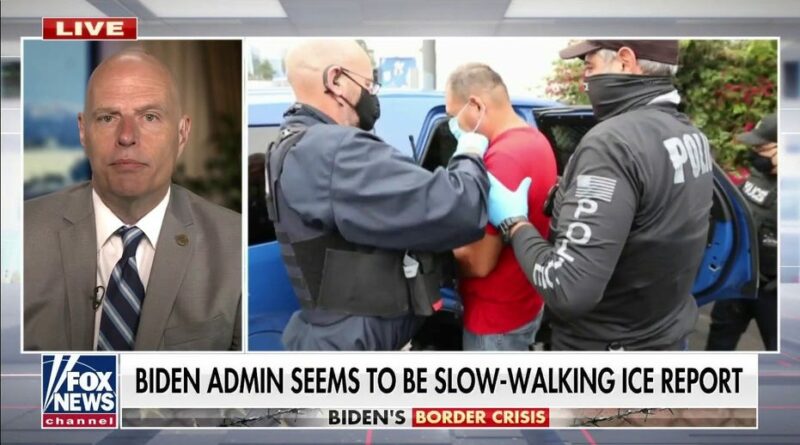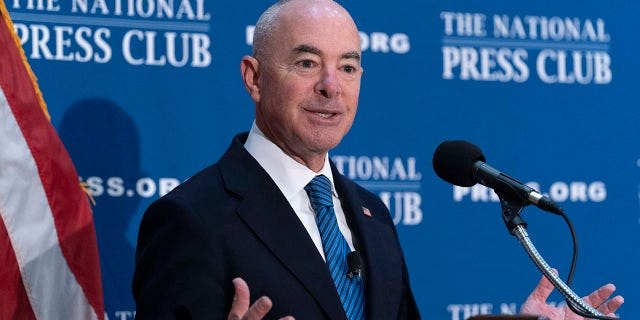Biden plans tax-funded legal services program for 'Remain in Mexico' immigrants: report
ICE has still not released the 2021 border report
Former Border Patrol Chief Ron Vitiello on why the border report has not yet been released as 2021 saw a 278% increase in border apprehensions.
The Biden administration will look to make it easier for immigrants to seek legal services across the southern border with the launch of the Legal Access at the Border (LAB) program.
The program will launch in seven border cities, including San Diego, Calexico, Nogales, El Paso, Eagle Pass, Laredo, and Brownsville – all cities in which the Migrant Protection Protocols (MPP) was once enforced. MPP – also known as the “Remain in Mexico” policy – appears to have provided the motivation to create the program in the first place: Many legal aid organizations have remained wary of providing assistance due to the program, which some believe presents a humanitarian issue.
U.S. authorities detained more than 1.7 million immigrants trying to cross the U.S.-Mexico border during the 2021 fiscal year, which ended in September – the most since the passage of President Ronald Reagan’s sweeping immigration reform bill in 1986.
Secretary of Homeland Security Alejandro Mayorkas speaks during a news conference at The National Press Club in Washington, on Thursday, Sept. 9, 2021.
(AP Photo/Jose Luis Magana)
The Justice Department’s Executive Office for Immigration Review (EOIR) will run the program after it gets off the ground, agency spokesperson Kathryn Mattingly told Axios. The Biden administration hopes to get the program going within the next 60 days.
The LAB program will mainly provide legal assistance, with contractors explaining options for staying in the U.S. while deportation orders remain pending, as well as general court practice and procedures individuals should be aware of prior to their appearance.
Sept. 18, 2021: Migrants camp under the International Bridge in Del Rio. (Rep. Pfluger.)
The program is part of the government’s wider “Access EOIR” initiative, which the Justice Department announced in September last year. The initiative aims to provide “noncitizens and their representatives” more resources for the legal mechanisms they will face trying to enter the country.
Biden signed several immigration-related executive orders in his first 100 days in office, many of which focused on undoing Trump-era immigration policies such as “Remain in Mexico.” Biden’s new orders resulted in a 60% decrease in ICE arrests, according to the Migration Policy Institute.
CIUDAD ACUNA, MEXICO – SEPTEMBER 20: Mounted U.S. Border Patrol agents watch Haitian immigrants on the bank of the Rio Grande in Del Rio, Texas on September 20, 2021 as seen from Ciudad Acuna, Mexico. As U.S. immigration authorities began deporting immigrants back to Haiti from Del Rio, thousands more waited in a camp under an international bridge in Del Rio while others crossed the river back into Mexico to avoid deportation.
((Photo by John Moore/Getty Images))
But a federal court order in November last year forced Biden to re-implement the policy.
“As required by a federal court order, the Department of Homeland Security (DHS) has been working in good faith to re-implement the Migrant Protection Protocols program,” the Department of Homeland Security said in a statement at the time. “Today, in coordination with the Departments of State and Justice, DHS announced key changes to MPP to address humanitarian concerns raised by the Government of Mexico and shared by the U.S. Government.”
And Department of Homeland Security Secretary Alejandro Mayorkas this week said that “unlawful presence” in the United States alone will no longer serve as a reason for deportation.
“Rather, we will allocate our efforts, we will allocate our resources on those individuals who present a current public safety threat, a threat to national security, or a threat to our border security, and that is a very important principle,” Mayorkas said during his address at the U.S. Conference of Mayors.
“I will be coming to you and asking you to reconsider your position of non-cooperation and see how we can work together. And I may not succeed initially in a wholesale reversal of your position, but I am willing to work in increments with you because the public’s safety, the public’s well-being, for which we are all charged, is I think at issue,” he added.
Source: Read Full Article





